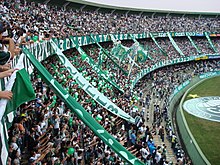This article needs additional citations for verification. (February 2023) |

Torcidas organizadas (Portuguese pronunciation: [toʁˈsidɐz oʁɡɐ̃niˈzadɐs], organized fans or organized supporters) are formal (or informal) associations of football fans in Brazil in the same vein as barras bravas in the rest of Latin America, hooligan firms in United Kingdom and ultras in the rest of Europe, North America, Asia, Australia and North Africa.
The torcidas are characterized by forming associations looking for the best way to support the team with flags, football chants, mosaics and performances inside and outside the stadium. The rationale for the fans' behavior is that it can help the team gather strength to beat the opponent. Although their main and explicit objective is to support their clubs, torcidas are also linked with several incidents of hooliganism and football violence.[1]
The name is based on the Portuguese verb torcer, which means "to wring" or "to twist"; the definition shifted to "to root for" after wringing scarfs became an emotional outlet for female Brazilian spectators attending football matches in the 1930s.
Due to hooliganism and violence associated with the Torcidas organizadas, the Brazilian government created the Estatuto do Torcedor, a law which regulates the Torcidas organizadas, giving them rights and duties.[2]
- ^ "Violência entre torcidas: Problema assombra o futebol brasileiro desde a década de 90". TV Cultura (in Brazilian Portuguese). Retrieved 2023-12-28.
- ^ "Estatuto do Torcedor: O que é, funcionamento e controvérsias". Aurum (in Brazilian Portuguese). 2020-08-18. Retrieved 2023-01-31.